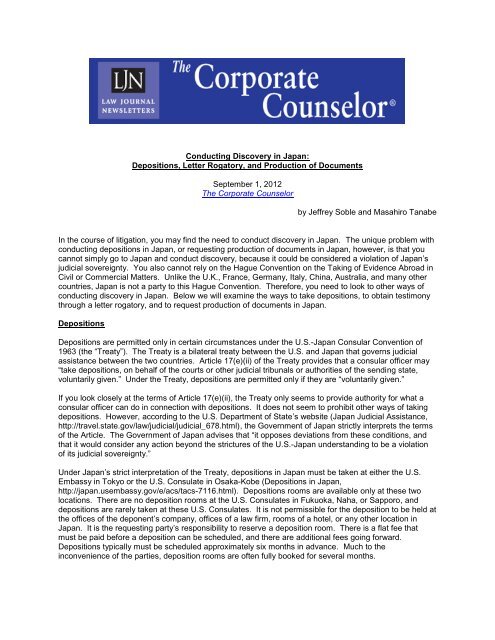The Process Involved in Filing Letters Rogatory: A Step-by-Step Overview
Letters Rogatory Explained: Facilitating Legal Participation In Between Countries

Definition of Letters Rogatory
Letters rogatory are formal demands made by a court in one jurisdiction to a court in one more territory, looking for support in acquiring proof or testimony for a legal action. This procedural system is essential in the context of worldwide legislation, where lawful systems may differ, and cross-border teamwork is necessary. Letters rogatory help with the event of details that may be important for settling instances, especially in instances including complicated global concerns.
Generally, these requests develop in civil, criminal, or management issues where a celebration calls for proof that is situated outside the territory of the asking for court. The letters function as a means to guarantee that the principles of due process are maintained, making it possible for courts to accessibility proof that could or else continue to be inaccessible due to geographic or legal obstacles.
The use of letters rogatory is controlled by international treaties, bilateral contracts, or residential laws, which define the procedures and responsibilities of the courts included. It is essential to note that the execution of such requests is not guaranteed; they rely on the regulations and techniques of the territory getting the letter. Therefore, letters rogatory are a critical tool for fostering lawful participation and making certain justice throughout borders.
The Process of Issuing Letters Rogatory
Issuing letters rogatory includes a structured process that ensures conformity with both residential and worldwide lawful requirements. Initially, the asking for celebration, usually a court or legal authority, drafts an official request detailing the nature of the aid looked for, the evidence or details needed, and the legal basis for the demand. This document has to be accurate to facilitate understanding by the international jurisdiction.

The following action entails sending the letters rogatory to the designated foreign authority. This is often done through polite channels or worldwide legal assistance frameworks, ensuring that the demand is gotten and recognized by the international court. The foreign court after that refines the request according to its own lawful treatments, inevitably replying to the asking for celebration with the in-demand information or evidence, thus helping with international lawful teamwork.
Value in International Law
The importance of letters rogatory in international law can not be overemphasized, as they work as an essential mechanism for judicial participation across borders. These official ask for aid in lawful matters permit courts in one jurisdiction to look for info, proof, or the existence of witnesses from another territory, thus promoting the management of justice in transnational situations.
Letters rogatory are particularly vital in the context of globalization, where legal disagreements frequently span multiple countries. They enable the collection of proof that may or else be unattainable, making certain that lawful procedures are informed and reasonable. By promoting partnership between judicial systems, letters rogatory assistance copyright the policy of regulation and advertise shared respect amongst countries.
Additionally, making use of letters rogatory demonstrates a commitment to worldwide standards and concepts of participation, mirroring the interconnected nature of modern legal practices. It shows the significance of sticking to recognized procedures and treaties, such as the Hague Convention, which supplies a structure for these demands - Letters rogatory. Inevitably, letters rogatory improve the efficacy of lawful procedures, making certain that justice is not hindered by geographical limits
Obstacles and Limitations
Despite their value, letters rogatory face a number of difficulties and restrictions that can hinder their efficiency. One key concern is the differing legal frameworks and procedures throughout jurisdictions, which can bring about misunderstandings and delays in the execution of demands. Different countries may have unique needs for the legitimacy of letters rogatory, making complex the procedure better.
Additionally, the typically drawn-out next page nature of global lawful participation can prevent prompt accessibility to proof or witnesses. This hold-up might negatively affect continuous examinations or legal procedures, specifically in instances needing urgent action. The lack of resources and training in some territories can result in inadequate handling of requests, leading to insufficient or incomplete responses.
Social distinctions and varying perspectives in the direction of legal procedures can additionally present significant obstacles. For circumstances, countries with much less official legal systems might have a hard time to adhere to the procedural rigor expected in letters rogatory. Political tensions in between countries can influence the readiness to perform demands, resulting in a lack of participation and reducing the utility of this system in international legislation. These obstacles require continuous dialogue and reform to boost the efficacy of letters rogatory in lawful participation.
Situation Studies and Instances

Conversely, difficulties can develop, as seen in a situation entailing a European country looking for proof in an ongoing criminal matter from a non-EU country - Letters rogatory. The process was delayed as a result of bureaucratic obstacles and varying legal requirements, inevitably preventing the investigation
These examples highlight that while letters rogatory can help with global cooperation and speed up legal process, they likewise highlight the demand for clear interaction and understanding of lawful frameworks between nations. Such situation researches emphasize the importance of refining this tool to improve effectiveness and performance in global legal matters.
Conclusion
In summary, letters rogatory offer as an important system for promoting lawful participation in between nations, guaranteeing the collection of evidence and testimony across jurisdictions. Their importance in worldwide legislation can not be overstated, as they advertise due procedure and boost the efficiency of cross-border lawful proceedings. Nonetheless, challenges such as varying legal frameworks and political tensions might prevent their effectiveness. Proceeded initiatives to simplify and boost the procedure are vital for promoting stronger international judicial cooperation.
Letters rogatory are formal demands made by a court in one jurisdiction to a court in an additional territory, seeking help in obtaining proof or statement for a lawful proceeding. The requesting party, typically a court or lawful authority, drafts an official request outlining the nature of the support looked for, the evidence or details needed, and the lawful basis for the demand. The international court then refines the demand according to its own lawful procedures, ultimately responding to the asking for event with the desired information or proof, therefore promoting international lawful teamwork.
In addition, the usage of letters rogatory advice shows a commitment navigate to this website to worldwide norms and concepts of participation, reflecting the interconnected nature of modern-day legal practices.Global lawful teamwork via letters rogatory is not without its real-world implications, as illustrated by different case researches that highlight both successes and challenges.